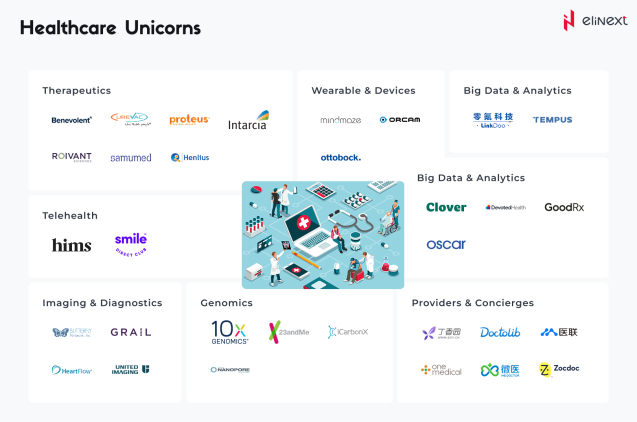As an outsource software development company, we rarely run out of ideas for topics. Elinext constantly explores tech trends and keeps a close eye on the industry leaders.
Our main readers and customers are mid-size and big companies with huge capitalization. So-called “unicorns” – the companies with the funding and capitalization of 1 billion USD are not quite the businesses we deal with on a daily basis.
t wouldn’t hurt to take a look at what has led the current unicorns to the success. That would potentially allow us to assess the probabilities of a startup in 2020 to join the list someday. Obviously, it would be a rough start for such a beginning as the economic conditions are rather tough in the day.
Without further ado, let’s get to the list of current healthcare unicorns and explore how healthcare app development solutions are driving innovation and success in this field. Since we all know (thanks to Sean Parker/Justin Timberlake in Fincher’s “The Social Network”) that a million dollars isn’t cool, it’s time to see a real deal.
The List of Current Healthcare Unicorns
CB Insights, a research group explores (among the other things) funding across multiple industries, healthcare included.
According to their data, there are 31 healthcare companies (as of June 2020) that have gotten VC funding of over 1 billion dollars.

8 Types of Categories for Healthcare Unicorns
There is quite a number of categories a successful rich-funded company could be involved in.
Billions of VC-money are spread across various categories and divisions of healthcare business: from telehealth to imaging for diagnostics. Let’s dive into the categories to receive more details.
Therapeutics
Design, discovery, and future development of digital therapeutics are the main activities presented in this category.
Intarcia Therapeutics claims that it is dedicated to redesigning the treatment of chronic disease. The medical tech company designs a drug delivery device that could be used for monitoring chronic diseases and contribute to its treatment. The device is being placed under the skin of the patient.
Roivant Sciences are also into drugs invention. They manufacture therapeutics that help people battle with severe conditions, like Parkinson’s disease, or diabetes.
The number of companies in this sector is the biggest as you can see from the picture above.
Wearables & Devices
This is easy to break down. The companies in this category are producing devices for medical care, such as rehab and recovery, for instance.
Mindmaze positions itself as a neurotechnology company. They are developers of VR medical device system that contributes to neuro-rehab therapy programs of the patients
Orcam is a tech giant with the products that help blind and bad-sighted people recognize other people’s faces, or read by vocalizing written texts
Big Data & Analytics
The name of the category is self-explanatory: the companies presented here are collecting data and make insightful analyses of it. That enables predictive healthcare analytics as well.
Tempus is a tech company that possesses the world’s largest library of clinical and molecular data, and an operating system to make that data accessible and useful. That enables physicians to make real-time, data-driven decisions to deliver personalized patient care.
Likewise, Linkdoc Technology is a Chinese company that works with cancer patients and their clinical data.
Telehealth
Companies in this space the developers if digital platforms to deliver affordable health products to consumers.
Hims is a men’s health startup. Smile Direct Club is focused on teeth alignment products.
Imaging & Diagnostics
Quite a number of startups in this category. Usually, the possess data platforms that enable detecting diseases.
Startups here are combining medical imaging tech, data platforms, and tests to diagnose and detect diseases.
Grail is focused on cancer prevention: they use computational algorithms to develop population-wide blood tests to help detect early-stage cancer.
HeartFlow is a diagnostics startup that uses CT scan data to analyze the impact that blockages could have on blood flow.
Genomics
Capturing, sequencing, or analyzing genetic data is the main focus of the companies
Oxford Nanopore Technologies claim that their goal is to enable the analysis of any living thing, by anyone, anywhere. They are an England-based biotech company that offers that offers DNA sequencing technology.
Insurance & Drug Pricing
These companies are using software techto deliver insurance and drug price information directly to consumers using online platforms.
Oscar Health is the brightest representative of such a company – it is an online direct-to-consumer insurance company that provides access to on-call doctors and health management applications.
Providers & Concierges
Startups that operate in this sector produce online portals to connect patients and physicians to health facilities and services.
Medlinker is a Chinese mobile social networking platform for physicians to connect over and discuss treatment measures for various medical cases.
The full list of current healthcare unicorns is presented in this table. Back in 2019, there were just 19 healthcare companies here, as opposed to the current number of 31.
The Typical New Upcoming Unicorn: JD Health
JD Health is an eCommerce platform that helps the owners sell health-related products: vitamins, supplements, medical devices. The business also taps into the wholesale drugs market and web-based hospital services.
Also, coincidentally, they are of the same name as, perhaps, the most beloved medical TV character – from the show “Scrubs”.
Deloitte forecast China’s online pharmacy sector will be worth $57 billion this year. Obviously, this is a nice field for investments, and that is the main reason such huge investments are going JD Health’s way.
China’s State Council introduced the policy back in 2018 to encourage cooperation between internet companies and healthcare providers.
Pharmaceutical Administration Law, which came into effect in December 2019, effectively enabled to online sales of prescription drugs, previously not prohibited but limited to operations.
That attracted several big Chinese companies to move into this sector, but they haven’t shown any profit in the sector as of yet. Among the big names in the sector are Ping An Healthcare and Technology, a part of Chinese insurance giant Ping An Insurance, and Ali Health, a unit of Alibaba, have been listed publicly on the Hong Kong stock market.
Xin Lijun, the chief executive of JD Health, claimed the company has been profitable because of factors that include E-Commerce strength, well-established supply chain, and its strong partnership connections with drug makers and hospitals.
“If you want to expand vertically into the retail drug business, it has to be integrated with hospitals and the medical services they provide,” Xin said.
JD Health is also exploring opportunities beyond the online pharmacy model. They are developing AI directions in their unity with the hospitals. These efforts include using AI to advise patients of the most appropriate department to call for an appointment based on the symptoms they have.
The accuracy rate of such AI advice is as high as 95%. JD Health will also deploy AI to help doctors more accurately prescribe medicine.
As economic headwinds persist amid growing competition among China’s online marketplaces, JD.com has been diversifying beyond its core eCommerce business.
Conclusion
The next healthcare unicorn will definitely be one of the companies that already are presented at the market, whether it is some E-Commerce giant would enter healthcare game, or some established startup would earn another round of investments.
The segmentation of healthcare unicorns varies, but there are more than enough directions that are worth beginner’s attention.








